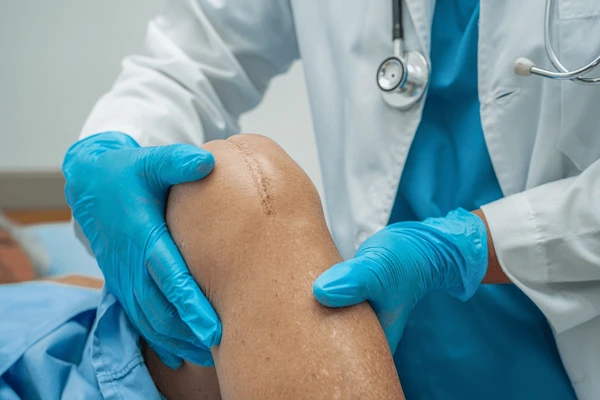Best Revision Joint Replacement in Ahmedabad
When Longevity Meets Precision: Renew Your Joint, Renew Your Life.
Revision Joint Replacement
Revision joint replacement is a surgical procedure performed to replace or repair an existing artificial joint that has failed or worn out. Over time, implants from total hip or knee replacements may loosen, wear out, or develop complications like infections or fractures.
Revision surgery restores functionality, addresses pain, and improves the longevity of joint implants for better mobility and quality of life.


Address Implant Failure
Over time, implants can loosen, wear out, or break. Revision surgery replaces the damaged components to restore joint stability and function.

Fix Post Surgical Complications
Issues like infection, dislocation, or misalignment can arise after the initial surgery. Revision surgery helps correct these complications effectively.

Improve Mobility and Function
If pain, stiffness, or instability has returned, revision surgery can help regain movement, strength, and overall joint performance.

Restoring Quality of Life
By reducing pain and improving joint mechanics, revision surgery allows patients to return to everyday activities with greater comfort and confidence.
Why Revision Joint Replacement?
Revision Joint Replacement is a specialized procedure aimed at restoring function, reducing pain, and improving quality of life. Here’s why it may be needed:
How Does Revision Joint Replacement Work?
Diagnosis and Planning
Imaging techniques like X-rays, CT scans, and lab tests identify the cause of implant failure. Surgeons then create a personalized surgical plan to address specific issues.
Surgical Procedure
The damaged implant is removed, and any compromised bone or tissue is repaired or reinforced. A new implant or revised components are placed to restore joint functionality and stability.
Post-Surgery Recovery
Rehabilitation begins shortly after surgery to rebuild strength and mobility. Follow-up care ensures the implant performs effectively and supports long-term recovery.
Types of Revision Joint Replacement
Revision Total Hip Replacement
In this procedure, a failing or worn-out hip implant is replaced with a new one. It addresses complications such as implant loosening, dislocation, or fractures around the implant. Surgeons may also reinforce bone loss with grafts or specialized components to ensure the revised implant fits securely.
Revision Total Knee Replacement
This surgery replaces a malfunctioning or damaged knee implant. It is performed to fix issues like joint instability, implant wear, or infection. Bone grafts or custom implants may be used to strengthen the knee joint and restore stability and mobility.
Benefits Of Revision Joint Replacement
Restored Functionality
Improves joint stability and range of motion for daily activities.
Pain Relief
Eliminates chronic discomfort caused by implant issues.
Enhanced Implant Longevity
Extends the life of the joint with durable and advanced replacement components.
Address Complications
Corrects problems like infections, fractures, or implant misalignment.
Why Choose Dr. Ajaysinh Devda?
Experienced Surgeons
Our team is led by highly skilled orthopedic surgeons with years of specialized experience in joint replacement and robotic-assisted procedures, ensuring expert care at every step.
Advanced Facilities
We utilize the latest in robotic surgical systems and 3D imaging to deliver precise, personalized knee replacements with improved accuracy and better long-term results.
Comprehensive Care
From diagnosis to post-surgery rehabilitation, we provide end-to-end care to meet your needs ensuring a smooth, safe, and comfortable recovery journey.
Proven Track Record
With consistently successful outcomes and high patient satisfaction, our center is trusted for delivering advanced orthopedic care backed by clinical excellence.
High success rates with satisfied patients regaining their mobility and comfort.
Have a Question?
FAQ
What is the difference between a replacement and a revision?
A joint replacement is the initial surgery where a damaged joint is replaced with an artificial implant, typically due to arthritis or injury. A revision joint replacement, on the other hand, is a follow-up procedure done when the original implant wears out, becomes loose, infected, or fails in some way.
How long does it take to recover from a revision knee replacement?
Recovery from a revision knee replacement generally takes longer than recovery from an initial knee replacement. Most patients need 3 to 6 months to regain mobility and strength, although complete recovery can take up to a year depending on the extent of the surgery and individual health factors. Physiotherapy plays a key role in the healing process.
How many times can a knee revision be done?
Technically, a knee can undergo multiple revision surgeries, though the complexity and risks increase with each procedure. The number of possible revisions depends on several factors such as bone quality, tissue condition, and the reason for previous implant failures.
Are revision surgeries riskier than primary replacements?
Yes, revision joint surgeries generally carry more risks compared to first-time (primary) replacements. These risks include longer operation times, greater blood loss, higher chances of infection, and more demanding recovery. However, with expert care and proper planning, the outcomes can still be very successful.
Can revision surgery prevent further complications?
Yes, when performed at the right time and by skilled surgeons, revision surgery can address underlying issues and help prevent further complications like implant loosening, infection, or joint instability. By correcting the problem early, revision surgery can restore joint function, reduce pain, and enhance overall quality of life.
